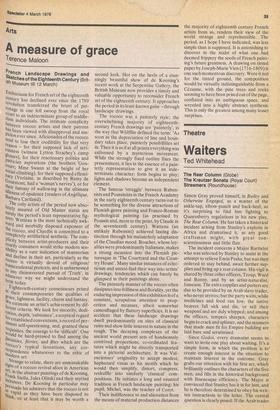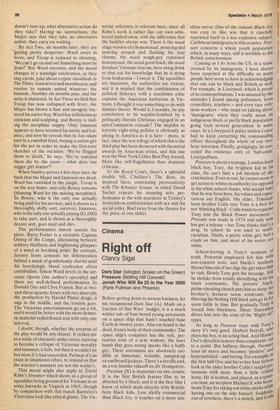Theatre
Waiters
Ted Whitehead
The Rear Column (Globe) The Kreutzer Sonata (Royal Court) Streamers (Roundhouse)
Simon Gray proved himself, in Butley and Otherwise Engaged, as a master of the
ankle-tap, elbow-punch and back-heel, so it's surprising to find him fighting to Queensberry regulations in his new play,
The Rear Column. He has taken a historical incident arising from Stanley's exploits in Africa and dramatised it, as any good craftsman might, with great conscientiousness and little flair.
The incident concerns a Major Barttelot who was selected by Stanley to assist in the attempt to relieve Emin Pasha, but was then ordered to stay behind, await further supplies and bring up a rear column. His vigil is shared by three other officers, Troup, Ward and Bonny, and by an artist-naturalist, Jameson. The extra supplies and porters are due to be provided by an Arab slave trader, who never arrives; but the party waits, while medicines and food run low, the native bearers fall sick and die, or sell their weapons' and are duly whipped; and among the officers, tempers sharpen, characters begin to crack and splinter, and the manners that made men fit for Empire building are laid bare and scrutinised.
Since Godot, every dramatist seems to want to write one play about waiting. It's a simple form, in which the problem is to' create enough interest in the situation to maintain interest in the outcome. Gray grabs our attention with his first act, which brilliantly outlines the characters of the five men, and fills in the historical background with Ibsenesque efficiency. The Major is convinced that Stanley has it in for him, and he is therefore determined to obey his written instructions to the letter. The central ,question is clearly posed: If the Arab trader
doesn't turn up, what alternative action do they take? Having no instructions, the Major says that they take no alternative action: they carry on waiting.
By Act Two, six months later, they are -getting pretty desperate: Ward raves in fever, and Troup is reduced to shouting, 'We can't go on and on! Something must be done!' But Ward recovers, and the mood changes in a nostalgic celebration, as they sing carols, joke about cryptic classifieds in The Times, toast wives and sweethearts, and resolve to remain united whatever the hazards. Another six months pass, and the unity is shattered. In Act Three we find that Troup has now collapsed with fever, the Major has blown a fuse and savagely battered his native boy, Ward has withdrawn to cynicism and sculpting, and Bonny is raiding the morphine supply. Only Jameson appears to have retained his sanity and balance; and now he reveals that he has taken part in a cannibal feast, buying a native girl
for the pot in order to make the first-ever sketches of the occasion. 'We've flogged them to death,' he says, `We've watched them die by the score what does one nigger girl matter?'
When Stanley arrives a few days later, he finds that the Major and Jameson are dead, Ward has vanished in the jungle, Troup is on the way home, and only Bonny remains (blaming Ward for the missing morphine).
So Bonny, who is the only one actually being paid for his services, and is shown as a thoroughly shifty sort, survives; Jameson, who is the only one actually paying (£1,000) to take part, and is shown as a thoroughly decent sort, goes mad and dies.
The performances almost sustain the piece. Barry Foster is a veritable Captain Queeg of the Congo, alternating between military bluffness and frightening glimpses of a mind at breaking point. By contrast, Jeremy Irons conceals his deterioration behind a mask of gentlemanly charity until his horrifyingly bland confession about cannibalism. Simon Ward revels in the sar castic riposte (the author's specialty) and there are well-defined performances by Donald Gee and Clive Francis. But at two
' and-three-quarter hours with two intervals, the production by Harold Pinter drags; it
sags in the middle, and the tension goes. The Victorian entertainments go on a bit, and it would be better with the more dramatic material redistributed and with only one interval.
I doubt; though, whether the purpose of the play would be any clearer. It strikes me as a study of character under stress, aspiring to become a critique of Victorian morality and manners; it fails, but then it wouldn't be hot news if it had succeeded. Perhaps it's an
essay in situational ethics, to remind us that the warrior's manners are not the waiter's. . That moral might also apply to David Rabe's Streamer which shows us a group of
squaddies being groomed for Vietnam in an army barracks in Virginia in 1965, though by comparison with this bunch Barttelot's Victorians look like ethical giants. The Vic torian reference is relevant here, since all Rabe's work is rather like our own whiskered melodramas, with the difference that the baddies always win. There is the usual stage version of a homosexual, prancing and poncing around and flashing his rear charms, the usual tough-guy repressed homosexual, the usual good black, the usual drunken Vietnam veteran, here using drink to shut out his knowledge that he is dying from leukaemia I swear it. The squaddies are innocents, the authorities are vicious, and it is implied that the combination of political illiteracy with a machismo ethic explains the American barbarism in Vietnam. I thought it was something to do with domino theory. Would it, I wonder, be any consolation to be napalm-bombed by a politically literate Christian engaged in an anti-Communist crusade? The impulse to travesty right-wing politics is obviously as strong in America as it is here more, in fact, since the war trilogy of which this is the third play has been showered with theatrical awards by American critics, and this one won the New York Critics Best Play Award. More like self-flagellation than dramatic criticism.
At the Royal Court, there's a splendid double bill, Chekhov's The Bear, an inspired farce, contrasting provocatively with The Kreutzer Sonata, in which David Suchet repeats his stunning solo performance as the wife-murderer in Tolstoy's tremendous confrontation with sex and the social order. Reel twice from the theatre for the price of one ticket.



































 Previous page
Previous page